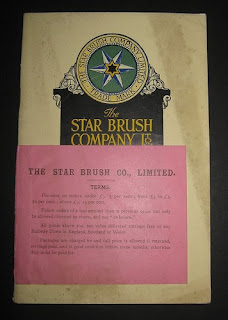Lowry refers to Board of Trade lime juice in his novel
Ultramarine when Dana is cleaning floor of the messroom on board the
Oedipus Tyrannus; "Here you are then. If you put some Board of Trade lime juice in that it'll come as white as a lamb's arse..." and "In the bucket is a mixture of soda and hot water. To this he adds three drops of lime juice, Board of Trade bottle, price 15s." - a task probably reflecting Lowry's time on the
Pyrrhus. There are references that it made a good cleaning substance (
See Ships Nostalgia)
All the ships were equipped with a medical locker which was stocked to the instructions as laid down by the Board of Trade which included Board of Trade lime juice, it was concentrated, very strong and it prevented scurvy, just as in the days of sail. In later years the practice was discontinued as a result of better diet and food being better preserved with the benefit of ships fridges. The regulations were laid out in the Merchant Shipping Act 1894:
The anti-scorbutics to be furnished shall be lime or lemon juice, or such other anti-scorbutics (if any) of such quality, and composed of such materials, and packed and kept in such manner as Her Majesty by Order in Council may direct.
(2), No lime or lemon juice shall be deemed fit and proper to be taken on board ship, for the use of the crew or passengers thereof, unless it has been obtained from n bonded warehouse for and to be shipped as stores.
(3)Lime or lemon juice shall not be so obtained or delivered from a warehouse as aforesaid, unless—
(a)it is shown, by a certificate under the hand of an inspector appointed by the Board of Trade, to be proper for use on board ship, the certificate to be given upon inspection of a sample, after deposit of the lime or lemon juice in the warehouse; and
(b)it contains fifteen per cent. of proper and palatable proof spirit, to be approved by the inspector or by the proper officer of customs, and to be added before or immediately after the inspection thereof ; and
(c)it is packed in such bottles at such time and in Such manner and is labelled in such manner as the Commissioners of Customs may-direct.
There was even a folk song about the Act:
Now, if you want a merchant ship to sail the sea at large
We'll not have any trouble if ye have a good discharge,
Signed by the Board o' Trade an' ev'rything exact,
For there's nothin' done on a Limejuice ship contrary to the Act. (
Read more)
Stan Hugill wrote:
The Merchant Shipping Act came out in the year 1894, and in it was laid down the amount of food, water, etc., Sailor John was allowed when on shipboard. This doling out of rations was known to John as "Pound and Pint". The Act also covered fines and punishments for delinquent mariners, such as "For concealing Knuckledusters, Slung-shot, sword-stick, etc. 5s. for each day of concealment', and many commandments and regulations in similar strain. But the item around which the sarcastic song was built was also the origin of the Yanks calling English sailors "Limejuicers." This was the daily issuing of limejuice to British crews when they had been a certain number of days at sea. Shanties from the Seven Seas 1994







